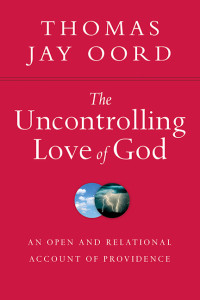Does God Control the Wind and Waves?
In a recent International Journal of Systematic Theology article, Kevin Vanhoozer offered a dialogue between John Webster’s views of love and my own. In one section, he wonders if my view of God’s uncontrolling love accounts for miracles, including the biblical claim that “even the wind and waves obey” Jesus. I think it does.
Vanhoozer offers insights in his essay, but he also asks questions and offers criticisms of my work. My lengthy response is coming out soon in a book. Because some have read the recently published journal article and wondered about my response, I’m willing to send my full response now as an email attachment to those asking for it. Just contact me.
Nature Miracles
Vanhoozer asks about how my views of what I call “special divine action” account for what many biblical scholars call “nature miracles.” Before I address his specific case, let me note that the majority of miracles mentioned in the Bible or that occur today pertain to healings, exorcisms, and personal transformation. These miracles involve persons or organisms rather than inanimate objects.
My proposal that God acts miraculously through uncontrolling love accounts well for the person and organism miracles we find in the Bible and witness today. These miracles either explicitly mention creaturely cooperation, or we can easily imagine such cooperation playing a role.
Inanimate Objects
My proposal requires more work when explaining nature miracles. Nature miracles involve inanimate objects, and I don’t think inanimate objects have the capacity for intentional responses. To account for God’s uncontrolling love in nature miracles, therefore, I explore quantum and chaos theories in The Uncontrolling Love of God.
Vanhoozer correctly summarizes my view that prominent theories in physics could explain the creaturely component in the Red Sea miracle. Such theories compliment my view that when doing nature miracles, God acts in relation to inanimate creation without controlling it. When the conditions are right among inanimate objects, God’s action produces miracles.
God Controls the Wind and Waves?
After summarizing my view of nature miracles, however, Vanhoozer says, “Oord fails to deal with the episode where Jesus works a miracle that elicits the astonished response, ‘Who is this, that even the wind and sea obey him?’ (Mark 4:41).” Vanhoozer is right that I had yet to address this biblical statement.
Interestingly, the straightforward reading of this exclamation in Mark leads one to regard the wind and sea anthropomorphically. The language of the text suggests that wind and sea act like personal entities capable of choosing to “obey” Jesus (or perhaps not). If wind and sea are capable of obedient responses, my view that miracles require creation to cooperate with God fits this story well.
Creatures Can Disobey God’s Commands
Many Christians have read into the biblical text, however, the idea that both animate and inanimate creatures can do no other than obey God. All creation must obey God’s commands.
I think differently. Uncontrolling love can be disobeyed, as we know so well from our own experiences. I often asked my daughters to obey me, for instance, but they refused. Saying someone obeyed God need not be construed to mean the person had no choice. Such construal would make biblical references to human disobedience unintelligible.
If we move against a straightforward reading of the text and instead think of wind and sea as inanimate objects, however, we’ll need theories in physics to account for God’s powerful but uncontrolling activity. As I admit above, accounting for miracles among inanimate systems is more difficult. But I think it’s possible, as I also explain in The Uncontrolling Love of God.
Nothing in the Bible Requires Us to Believe God Controls
But there’s a more important biblical point: nothing in Scripture explicitly says God’s miraculous activity involves control over others, even over inanimate creation.
Christians have typically read the biblical miracle stories through perspectives shaped by metaphysical assumptions about divine power not explicitly supported by the text. They come to the Bible thinking God can control, despite there being no unambiguous biblical claim for such control.
I know of nothing in the Bible that explicitly says God entirely controlled creatures or inanimate creation.
Did God Control Pharaoh?
The text most often cited as describing God controlling others – what is philosophically called unilaterally determinative divine power, metaphysical coercion, or a sufficient cause – refers to God hardening Pharaoh’s heart. Did God entirely control Pharaoh?
The biblical passages do NOT explicitly say God controlled Pharaoh. “Hardened” is not the same as “took away free will.” In fact, some biblical passages say Pharaoh hardened his own heart.
Biblical translators have apparently assumed that God controls when choosing words like “hardened” to describe God’s activity in relation to Pharaoh. But other English words are also viable translations, and these do not have the connotations of coercion that “hardening” can have.
On these issues, see the work of various Old Testament scholars, including Terence Fretheim, Exodus: Interpretation (Philadelphia: Westminster/John Knox, 2010). Many such scholars say we should interpret the story as NOT requiring us to think God controlled Pharaoh. For more on this, see my essay, “Does the Bible Say God Controls?”
Conclusion
In future blog essays, I’ll show that other important Christian ideas – such as God creating the universe and raising Jesus from the dead – do not require us to think God can control others. But for this essay, let me repeat my main point: God can act miraculously without controlling inanimate creation, such as wind and waves.

Comments
Great article. Would love to hear your full response